
- SAP Community
- Products and Technology
- Technology
- Technology Blogs by Members
- ABAP Program to delete the requests from the WO DS...
- Subscribe to RSS Feed
- Mark as New
- Mark as Read
- Bookmark
- Subscribe
- Printer Friendly Page
- Report Inappropriate Content
Applies to:
SAP BW 3.5x / Business Intelligence 7.3x.
Author Bio

Author(s) : Jai Gupta
Company : Infosys Limited
Created on : 05 November 2012
Jai Gupta works as Senior Systems Engineer in Infosys Limited. He has 2.7 years of experience in
SAP ABAP/BW. He has worked on Various Support and implementation Projects.
Business scenario:
In our business scenario, we needed an ABAP program which can delete the data from the WO DSO's based on the day interval or the number of the requests needed to be deleted from a given specified date. For eg if in a WO DSO's we want to delete the request for September and October months, then we will provide the details as 1.09.2012 and 31.10.2012 for the deletion of data or if we want to delete the latest request for the month of October then we will put 31.10.2012 and request count as 1.In case two requests are needed to be deleted then we can give 2 as request count. Detail explanation is provided below:
User Manual:
As shown in the selection screen below, we have to specify the WO DSO's name and Date-To as they are mandatory parameters.

Date-To: specify the date below which data will be deleted.
Date From: specify the date after which the data will be deleted.
Request Count: specify the number of requests we want to delete from the respective WO DSO's.
Both these dates are inclusive and will be included during data deletion.
Validations:
- Between Date From or Request count, only one of them should be mentioned


- Both Date From or Request count shouldn't be mentioned simultaneously
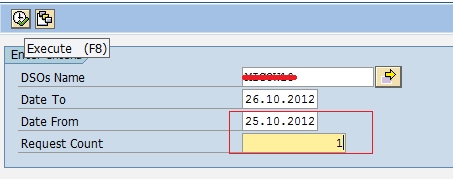

- Date To should be greater than Date From
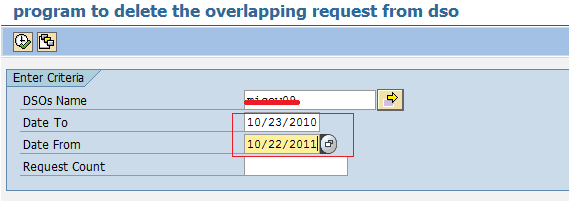

Demo1 :Using Date To and Date from in the selection screen
Executing the program
In the Selection screen, enter the WO DSO's names and the values for Date To and Date From as shown above.
Before Image:
 DSO1
DSO1
 DSO2
DSO2
Expected Result: So according to the criteria specified above, request id 6919830 should get deleted from the DSO1 and request id 6919829 should get deleted from the DSO2.
Program Output:

After the program completion a message will trigger showing the details of the request deleted from the WO DSO's as shown above.
After Image:
 DSO1
DSO1
 DSO2
DSO2
Actual Result: Same as expected result.Requests 6919830 & 6919829 from DSO1 and DSO2 got deleted successfully as shown above.
Demo2 :Using Date To and Date from in the selection screen
Executing the program
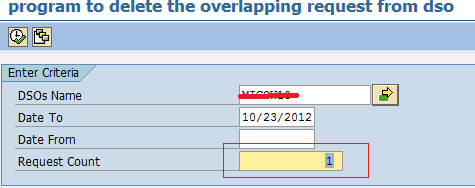
In the selection screen enter the WO DSO's details, then the Date To and after that Request Count. According to the above selection criteria, the first request present in the WO DSO's corresponding to date less than equal to 23.10.2012 will get deleted from both the WO DSO's . For e.g. if we have two requests which was updated on the WO DSO' s on 23.10.2012 then the request which got loaded later deleted. Also if we don't have any request loaded in WO DSO's on 23.10.2012 then the requests for the date less than 23.10.2012 will be checked and deleted i.e. if we have request for date 22.10.2012 and 21.10.2012 then the 22.10.2012 request will be deleted depending upon the request count in the last loaded first deleted basis.
Before image:
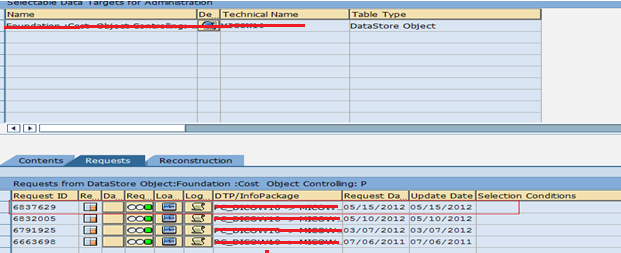 DSO1
DSO1
 DSO2
DSO2
Expected Result: So according to the criteria specified above, request id 6837629 should get deleted from the DSO1 and request id 6837628 should get deleted from the DSO2.
Program Output:

After Image: DSO1
DSO1
 DSO2
DSO2
Actual Result: Same as expected result.
Other Utilities: It can be used in process chains to delete the overlapping requests from the WO DSO's.
As shown in the below screen, we have used the ABAP program to delete the over lapping requests from the WO DSO's DSO1 and DSO2.
for the deletion of over lapping request create an variant for the program having the following values:
DSO : Name of the WO DSO's from which you want to delete the request.
Date To: Current Date
Request Count: 1
Click on save button, a new screen will open. In this screen give the variant name and description as shown below:

For the field name Date To Click on the button highlighted above, a new window will appear.In this window choose Dynamic Date calculation.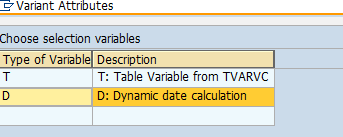

Now click on the button highlighted above, a new screen will appear, here choose current date.
After doing all these save the variable and use it in the ABAP program in the process chain as shown below:

After all this, u can schedule the process chain to check the working of the ABAP program in the PC.After scheduling go to the logs as shown below, there you can see the messages regarding deletion of requests from the DSO1 and DSO2.

Code:
The code of the program is mentioned below:
*&---------------------------------------------------------------------*
*& Report ZBW_ODSREQDEL_PLT3
*&
*&---------------------------------------------------------------------*
*&
*&
*&---------------------------------------------------------------------*
REPORT zbw_odsreqdel_plt3.
TABLES:rsiccont, rsreqdone,rsdodso.
SELECTION-SCREEN: BEGIN OF BLOCK a WITH FRAME TITLE text-001.
SELECT-OPTIONS: s_dso FOR rsdodso-odsobject NO INTERVALS OBLIGATORY.
PARAMETERS: p_dateto TYPE sy-datum OBLIGATORY,
p_datefr TYPE sy-datum ,
p_reqcnt TYPE i .
SELECTION-SCREEN: END OF BLOCK a .
TYPES: BEGIN OF t_dso,
odsobject TYPE rsdodso-odsobject,
odsotype TYPE rsdodso-odsotype,
END OF t_dso.
DATA: i_req_cube TYPE STANDARD TABLE OF rsiccont,
i_req_comp TYPE STANDARD TABLE OF rsseldone,
wa_req_cube LIKE rsiccont,
wa_req_comp LIKE rsseldone,
wa_req_comp1 LIKE rsseldone,
i_dso TYPE STANDARD TABLE OF t_dso,
wa_dso TYPE t_dso,
l_cnt TYPE i,
l_cnt2 TYPE i,
l_diff TYPE i,
l_message1 TYPE string,
l_message2 TYPE string,
l_message3 TYPE string,
l_message4 TYPE string,
l_message5 TYPE string,
l_message6 TYPE string,
l_timestamp1 TYPE timestamp,
l_timestamp2 TYPE timestamp,
l_tmzone TYPE tznzone,
l_reqcnt TYPE i,
l_reqcnt2(4) TYPE c.
IF p_reqcnt IS NOT INITIAL AND p_datefr IS NOT INITIAL.
MESSAGE text-005 TYPE 'E'.
ENDIF.
IF p_reqcnt IS INITIAL AND p_datefr IS INITIAL.
MESSAGE text-006 TYPE 'E'.
ENDIF.
IF p_dateto LT p_datefr.
MESSAGE text-007 TYPE 'E'.
ENDIF.
IF s_dso IS NOT INITIAL.
SELECT odsobject odsotype FROM rsdodso INTO TABLE i_dso WHERE odsobject IN s_dso
AND objvers = 'A'.
SORT i_dso BY odsobject.
DELETE ADJACENT DUPLICATES FROM i_dso COMPARING odsobject.
DESCRIBE TABLE i_dso LINES l_cnt.
IF p_dateto IS NOT INITIAL.
l_tmzone = 'UTC'.
CONVERT DATE p_dateto TIME '235959' INTO TIME STAMP l_timestamp1 TIME ZONE l_tmzone.
IF p_datefr IS NOT INITIAL.
CONVERT DATE p_datefr TIME '000001' INTO TIME STAMP l_timestamp2 TIME ZONE l_tmzone.
SELECT * FROM rsiccont INTO TABLE i_req_cube WHERE icube IN s_dso
AND ( timestamp LE l_timestamp1 AND timestamp GE l_timestamp2 ).
SORT i_req_cube BY icube timestamp DESCENDING.
DESCRIBE TABLE i_req_cube LINES l_cnt2.
IF i_req_cube IS NOT INITIAL.
CLEAR : l_message1,l_message2,wa_req_cube.
LOOP AT i_req_cube INTO wa_req_cube.
CALL FUNCTION 'RSSM_DELETE_REQUEST'
EXPORTING
request = wa_req_cube-rnr
infocube = wa_req_cube-icube.
CONCATENATE wa_req_cube-icube wa_req_cube-rnr l_message1 INTO l_message1 SEPARATED BY space.
ENDLOOP.
ENDIF.
IF l_cnt NE l_cnt2 OR i_req_cube IS INITIAL.
LOOP AT i_dso INTO wa_dso.
READ TABLE i_req_cube WITH KEY icube = wa_dso-odsobject TRANSPORTING NO FIELDS.
IF sy-subrc NE 0.
CONCATENATE wa_dso-odsobject l_message2 INTO l_message2 SEPARATED BY space.
ENDIF.
ENDLOOP.
ENDIF.
ELSE.
IF p_reqcnt IS NOT INITIAL.
SELECT * FROM rsiccont INTO TABLE i_req_cube WHERE icube IN s_dso
AND timestamp LE l_timestamp1.
SORT i_req_cube BY icube timestamp DESCENDING.
CLEAR: wa_dso,wa_req_cube,l_message1,l_message2.
LOOP AT i_dso INTO wa_dso.
l_reqcnt = p_reqcnt.
LOOP AT i_req_cube INTO wa_req_cube WHERE icube = wa_dso-odsobject.
CALL FUNCTION 'RSSM_DELETE_REQUEST'
EXPORTING
request = wa_req_cube-rnr
infocube = wa_req_cube-icube.
CONCATENATE wa_req_cube-icube wa_req_cube-rnr l_message1 INTO l_message1 SEPARATED BY space.
l_reqcnt = l_reqcnt - 1.
IF l_reqcnt LE 0.
EXIT .
ENDIF.
ENDLOOP.
IF l_reqcnt > 0.
l_reqcnt2 = l_reqcnt.
CONCATENATE wa_dso-odsobject l_reqcnt2 l_message2 INTO l_message2 SEPARATED BY space.
ENDIF.
ENDLOOP.
ENDIF.
ENDIF.
ENDIF.
IF l_message1 IS NOT INITIAL.
CONCATENATE l_message1 text-008 INTO l_message4 SEPARATED BY space.
IF l_message2 IS NOT INITIAL.
CONCATENATE l_message2 text-009 INTO l_message5 SEPARATED BY space.
CONCATENATE l_message4 l_message5 INTO l_message6 SEPARATED BY ','.
MESSAGE l_message6 TYPE 'S'.
ELSE.
MESSAGE l_message4 TYPE 'S'.
ENDIF.
ELSEIF l_message2 IS NOT INITIAL.
CONCATENATE l_message2 text-009 INTO l_message5 SEPARATED BY space.
MESSAGE l_message5 TYPE 'S'.
ENDIF.
ENDIF.Text Symbols:
001 Enter Criteria
002 Request count exceeds the no of requests currently in the DSO
003 Requests to be deleted exceeds the no of requests currently in the DSO
004 It is not a write optimized DSO
005 Either mention Request Count or Date-From
006 Enter Value in Request Count or Date-From
007 Date-To can not be less than Date-From
008 Requests deleted successfully
009 Requests are not deleted
Selection Texts:
P_DATEFR Date From
P_DATETO Date To
P_REQCNT Request Count
S_DSO DSOs Name
Enhancements:
The program can be modified to include standard DSO's as well in its scope..
- SAP Managed Tags:
- BW (SAP Business Warehouse)
You must be a registered user to add a comment. If you've already registered, sign in. Otherwise, register and sign in.
-
"automatische backups"
1 -
"regelmäßige sicherung"
1 -
"TypeScript" "Development" "FeedBack"
1 -
505 Technology Updates 53
1 -
ABAP
14 -
ABAP API
1 -
ABAP CDS Views
2 -
ABAP CDS Views - BW Extraction
1 -
ABAP CDS Views - CDC (Change Data Capture)
1 -
ABAP class
2 -
ABAP Cloud
2 -
ABAP Development
5 -
ABAP in Eclipse
1 -
ABAP Platform Trial
1 -
ABAP Programming
2 -
abap technical
1 -
absl
2 -
access data from SAP Datasphere directly from Snowflake
1 -
Access data from SAP datasphere to Qliksense
1 -
Accrual
1 -
action
1 -
adapter modules
1 -
Addon
1 -
Adobe Document Services
1 -
ADS
1 -
ADS Config
1 -
ADS with ABAP
1 -
ADS with Java
1 -
ADT
2 -
Advance Shipping and Receiving
1 -
Advanced Event Mesh
3 -
AEM
1 -
AI
7 -
AI Launchpad
1 -
AI Projects
1 -
AIML
9 -
Alert in Sap analytical cloud
1 -
Amazon S3
1 -
Analytical Dataset
1 -
Analytical Model
1 -
Analytics
1 -
Analyze Workload Data
1 -
annotations
1 -
API
1 -
API and Integration
3 -
API Call
2 -
API security
1 -
Application Architecture
1 -
Application Development
5 -
Application Development for SAP HANA Cloud
3 -
Applications and Business Processes (AP)
1 -
Artificial Intelligence
1 -
Artificial Intelligence (AI)
5 -
Artificial Intelligence (AI) 1 Business Trends 363 Business Trends 8 Digital Transformation with Cloud ERP (DT) 1 Event Information 462 Event Information 15 Expert Insights 114 Expert Insights 76 Life at SAP 418 Life at SAP 1 Product Updates 4
1 -
Artificial Intelligence (AI) blockchain Data & Analytics
1 -
Artificial Intelligence (AI) blockchain Data & Analytics Intelligent Enterprise
1 -
Artificial Intelligence (AI) blockchain Data & Analytics Intelligent Enterprise Oil Gas IoT Exploration Production
1 -
Artificial Intelligence (AI) blockchain Data & Analytics Intelligent Enterprise sustainability responsibility esg social compliance cybersecurity risk
1 -
ASE
1 -
ASR
2 -
ASUG
1 -
Attachments
1 -
Authorisations
1 -
Automating Processes
1 -
Automation
2 -
aws
2 -
Azure
1 -
Azure AI Studio
1 -
Azure API Center
1 -
Azure API Management
1 -
B2B Integration
1 -
Backorder Processing
1 -
Backup
1 -
Backup and Recovery
1 -
Backup schedule
1 -
BADI_MATERIAL_CHECK error message
1 -
Bank
1 -
BAS
1 -
basis
2 -
Basis Monitoring & Tcodes with Key notes
2 -
Batch Management
1 -
BDC
1 -
Best Practice
1 -
bitcoin
1 -
Blockchain
3 -
bodl
1 -
BOP in aATP
1 -
BOP Segments
1 -
BOP Strategies
1 -
BOP Variant
1 -
BPC
1 -
BPC LIVE
1 -
BTP
12 -
BTP Destination
2 -
Business AI
1 -
Business and IT Integration
1 -
Business application stu
1 -
Business Application Studio
1 -
Business Architecture
1 -
Business Communication Services
1 -
Business Continuity
1 -
Business Data Fabric
3 -
Business Partner
12 -
Business Partner Master Data
10 -
Business Technology Platform
2 -
Business Trends
4 -
CA
1 -
calculation view
1 -
CAP
4 -
Capgemini
1 -
CAPM
1 -
Catalyst for Efficiency: Revolutionizing SAP Integration Suite with Artificial Intelligence (AI) and
1 -
CCMS
2 -
CDQ
12 -
CDS
2 -
Cental Finance
1 -
Certificates
1 -
CFL
1 -
Change Management
1 -
chatbot
1 -
chatgpt
3 -
CL_SALV_TABLE
2 -
Class Runner
1 -
Classrunner
1 -
Cloud ALM Monitoring
1 -
Cloud ALM Operations
1 -
cloud connector
1 -
Cloud Extensibility
1 -
Cloud Foundry
4 -
Cloud Integration
6 -
Cloud Platform Integration
2 -
cloudalm
1 -
communication
1 -
Compensation Information Management
1 -
Compensation Management
1 -
Compliance
1 -
Compound Employee API
1 -
Configuration
1 -
Connectors
1 -
Consolidation Extension for SAP Analytics Cloud
2 -
Control Indicators.
1 -
Controller-Service-Repository pattern
1 -
Conversion
1 -
Cosine similarity
1 -
cryptocurrency
1 -
CSI
1 -
ctms
1 -
Custom chatbot
3 -
Custom Destination Service
1 -
custom fields
1 -
Customer Experience
1 -
Customer Journey
1 -
Customizing
1 -
cyber security
3 -
cybersecurity
1 -
Data
1 -
Data & Analytics
1 -
Data Aging
1 -
Data Analytics
2 -
Data and Analytics (DA)
1 -
Data Archiving
1 -
Data Back-up
1 -
Data Flow
1 -
Data Governance
5 -
Data Integration
2 -
Data Quality
12 -
Data Quality Management
12 -
Data Synchronization
1 -
data transfer
1 -
Data Unleashed
1 -
Data Value
8 -
database tables
1 -
Datasphere
3 -
datenbanksicherung
1 -
dba cockpit
1 -
dbacockpit
1 -
Debugging
2 -
Defender
1 -
Delimiting Pay Components
1 -
Delta Integrations
1 -
Destination
3 -
Destination Service
1 -
Developer extensibility
1 -
Developing with SAP Integration Suite
1 -
Devops
1 -
digital transformation
1 -
Documentation
1 -
Dot Product
1 -
DQM
1 -
dump database
1 -
dump transaction
1 -
e-Invoice
1 -
E4H Conversion
1 -
Eclipse ADT ABAP Development Tools
2 -
edoc
1 -
edocument
1 -
ELA
1 -
Embedded Consolidation
1 -
Embedding
1 -
Embeddings
1 -
Employee Central
1 -
Employee Central Payroll
1 -
Employee Central Time Off
1 -
Employee Information
1 -
Employee Rehires
1 -
Enable Now
1 -
Enable now manager
1 -
endpoint
1 -
Enhancement Request
1 -
Enterprise Architecture
1 -
ESLint
1 -
ETL Business Analytics with SAP Signavio
1 -
Euclidean distance
1 -
Event Dates
1 -
Event Driven Architecture
1 -
Event Mesh
2 -
Event Reason
1 -
EventBasedIntegration
1 -
EWM
1 -
EWM Outbound configuration
1 -
EWM-TM-Integration
1 -
Existing Event Changes
1 -
Expand
1 -
Expert
2 -
Expert Insights
2 -
Exploits
1 -
Fiori
14 -
Fiori Elements
2 -
Fiori SAPUI5
12 -
Flask
1 -
Full Stack
8 -
Funds Management
1 -
General
1 -
General Splitter
1 -
Generative AI
1 -
Getting Started
1 -
GitHub
8 -
Grants Management
1 -
GraphQL
1 -
groovy
1 -
GTP
1 -
HANA
6 -
HANA Cloud
2 -
Hana Cloud Database Integration
2 -
HANA DB
2 -
HANA XS Advanced
1 -
Historical Events
1 -
home labs
1 -
HowTo
1 -
HR Data Management
1 -
html5
8 -
HTML5 Application
1 -
Identity cards validation
1 -
idm
1 -
Implementation
1 -
input parameter
1 -
instant payments
1 -
Integration
3 -
Integration Advisor
1 -
Integration Architecture
1 -
Integration Center
1 -
Integration Suite
1 -
intelligent enterprise
1 -
iot
1 -
Java
1 -
job
1 -
Job Information Changes
1 -
Job-Related Events
1 -
Job_Event_Information
1 -
joule
4 -
Journal Entries
1 -
Just Ask
1 -
Kerberos for ABAP
8 -
Kerberos for JAVA
8 -
KNN
1 -
Launch Wizard
1 -
Learning Content
2 -
Life at SAP
5 -
lightning
1 -
Linear Regression SAP HANA Cloud
1 -
Loading Indicator
1 -
local tax regulations
1 -
LP
1 -
Machine Learning
2 -
Marketing
1 -
Master Data
3 -
Master Data Management
14 -
Maxdb
2 -
MDG
1 -
MDGM
1 -
MDM
1 -
Message box.
1 -
Messages on RF Device
1 -
Microservices Architecture
1 -
Microsoft Universal Print
1 -
Middleware Solutions
1 -
Migration
5 -
ML Model Development
1 -
Modeling in SAP HANA Cloud
8 -
Monitoring
3 -
MTA
1 -
Multi-Record Scenarios
1 -
Multiple Event Triggers
1 -
Myself Transformation
1 -
Neo
1 -
New Event Creation
1 -
New Feature
1 -
Newcomer
1 -
NodeJS
3 -
ODATA
2 -
OData APIs
1 -
odatav2
1 -
ODATAV4
1 -
ODBC
1 -
ODBC Connection
1 -
Onpremise
1 -
open source
2 -
OpenAI API
1 -
Oracle
1 -
PaPM
1 -
PaPM Dynamic Data Copy through Writer function
1 -
PaPM Remote Call
1 -
PAS-C01
1 -
Pay Component Management
1 -
PGP
1 -
Pickle
1 -
PLANNING ARCHITECTURE
1 -
Popup in Sap analytical cloud
1 -
PostgrSQL
1 -
POSTMAN
1 -
Prettier
1 -
Process Automation
2 -
Product Updates
4 -
PSM
1 -
Public Cloud
1 -
Python
4 -
python library - Document information extraction service
1 -
Qlik
1 -
Qualtrics
1 -
RAP
3 -
RAP BO
2 -
Record Deletion
1 -
Recovery
1 -
recurring payments
1 -
redeply
1 -
Release
1 -
Remote Consumption Model
1 -
Replication Flows
1 -
research
1 -
Resilience
1 -
REST
1 -
REST API
2 -
Retagging Required
1 -
Risk
1 -
Rolling Kernel Switch
1 -
route
1 -
rules
1 -
S4 HANA
1 -
S4 HANA Cloud
1 -
S4 HANA On-Premise
1 -
S4HANA
3 -
S4HANA_OP_2023
2 -
SAC
10 -
SAC PLANNING
9 -
SAP
4 -
SAP ABAP
1 -
SAP Advanced Event Mesh
1 -
SAP AI Core
8 -
SAP AI Launchpad
8 -
SAP Analytic Cloud Compass
1 -
Sap Analytical Cloud
1 -
SAP Analytics Cloud
4 -
SAP Analytics Cloud for Consolidation
3 -
SAP Analytics Cloud Story
1 -
SAP analytics clouds
1 -
SAP API Management
1 -
SAP BAS
1 -
SAP Basis
6 -
SAP BODS
1 -
SAP BODS certification.
1 -
SAP BTP
21 -
SAP BTP Build Work Zone
2 -
SAP BTP Cloud Foundry
6 -
SAP BTP Costing
1 -
SAP BTP CTMS
1 -
SAP BTP Innovation
1 -
SAP BTP Migration Tool
1 -
SAP BTP SDK IOS
1 -
SAP Build
11 -
SAP Build App
1 -
SAP Build apps
1 -
SAP Build CodeJam
1 -
SAP Build Process Automation
3 -
SAP Build work zone
10 -
SAP Business Objects Platform
1 -
SAP Business Technology
2 -
SAP Business Technology Platform (XP)
1 -
sap bw
1 -
SAP CAP
2 -
SAP CDC
1 -
SAP CDP
1 -
SAP CDS VIEW
1 -
SAP Certification
1 -
SAP Cloud ALM
4 -
SAP Cloud Application Programming Model
1 -
SAP Cloud Integration for Data Services
1 -
SAP cloud platform
8 -
SAP Companion
1 -
SAP CPI
3 -
SAP CPI (Cloud Platform Integration)
2 -
SAP CPI Discover tab
1 -
sap credential store
1 -
SAP Customer Data Cloud
1 -
SAP Customer Data Platform
1 -
SAP Data Intelligence
1 -
SAP Data Migration in Retail Industry
1 -
SAP Data Services
1 -
SAP DATABASE
1 -
SAP Dataspher to Non SAP BI tools
1 -
SAP Datasphere
9 -
SAP DRC
1 -
SAP EWM
1 -
SAP Fiori
3 -
SAP Fiori App Embedding
1 -
Sap Fiori Extension Project Using BAS
1 -
SAP GRC
1 -
SAP HANA
1 -
SAP HCM (Human Capital Management)
1 -
SAP HR Solutions
1 -
SAP IDM
1 -
SAP Integration Suite
9 -
SAP Integrations
4 -
SAP iRPA
2 -
SAP LAGGING AND SLOW
1 -
SAP Learning Class
1 -
SAP Learning Hub
1 -
SAP Master Data
1 -
SAP Odata
2 -
SAP on Azure
2 -
SAP PartnerEdge
1 -
sap partners
1 -
SAP Password Reset
1 -
SAP PO Migration
1 -
SAP Prepackaged Content
1 -
SAP Process Automation
2 -
SAP Process Integration
2 -
SAP Process Orchestration
1 -
SAP S4HANA
2 -
SAP S4HANA Cloud
1 -
SAP S4HANA Cloud for Finance
1 -
SAP S4HANA Cloud private edition
1 -
SAP Sandbox
1 -
SAP STMS
1 -
SAP successfactors
3 -
SAP SuccessFactors HXM Core
1 -
SAP Time
1 -
SAP TM
2 -
SAP Trading Partner Management
1 -
SAP UI5
1 -
SAP Upgrade
1 -
SAP Utilities
1 -
SAP-GUI
8 -
SAP_COM_0276
1 -
SAPBTP
1 -
SAPCPI
1 -
SAPEWM
1 -
sapmentors
1 -
saponaws
2 -
SAPS4HANA
1 -
SAPUI5
5 -
schedule
1 -
Script Operator
1 -
Secure Login Client Setup
8 -
security
9 -
Selenium Testing
1 -
Self Transformation
1 -
Self-Transformation
1 -
SEN
1 -
SEN Manager
1 -
service
1 -
SET_CELL_TYPE
1 -
SET_CELL_TYPE_COLUMN
1 -
SFTP scenario
2 -
Simplex
1 -
Single Sign On
8 -
Singlesource
1 -
SKLearn
1 -
Slow loading
1 -
soap
1 -
Software Development
1 -
SOLMAN
1 -
solman 7.2
2 -
Solution Manager
3 -
sp_dumpdb
1 -
sp_dumptrans
1 -
SQL
1 -
sql script
1 -
SSL
8 -
SSO
8 -
Substring function
1 -
SuccessFactors
1 -
SuccessFactors Platform
1 -
SuccessFactors Time Tracking
1 -
Sybase
1 -
system copy method
1 -
System owner
1 -
Table splitting
1 -
Tax Integration
1 -
Technical article
1 -
Technical articles
1 -
Technology Updates
14 -
Technology Updates
1 -
Technology_Updates
1 -
terraform
1 -
Threats
2 -
Time Collectors
1 -
Time Off
2 -
Time Sheet
1 -
Time Sheet SAP SuccessFactors Time Tracking
1 -
Tips and tricks
2 -
toggle button
1 -
Tools
1 -
Trainings & Certifications
1 -
Transformation Flow
1 -
Transport in SAP BODS
1 -
Transport Management
1 -
TypeScript
3 -
ui designer
1 -
unbind
1 -
Unified Customer Profile
1 -
UPB
1 -
Use of Parameters for Data Copy in PaPM
1 -
User Unlock
1 -
VA02
1 -
Validations
1 -
Vector Database
2 -
Vector Engine
1 -
Visual Studio Code
1 -
VSCode
2 -
VSCode extenions
1 -
Vulnerabilities
1 -
Web SDK
1 -
work zone
1 -
workload
1 -
xsa
1 -
XSA Refresh
1
- « Previous
- Next »
- App to automatically configure a new ABAP Developer System in Technology Blogs by Members
- Streamlining Time Sheet Approvals in SuccessFactors: Time Sheet Approval Center in Technology Blogs by Members
- ABAP Cloud Developer Trial 2022 Available Now in Technology Blogs by SAP
- Switch on gCTS (for existing packages) in Technology Blogs by SAP
- Receive a notification when your storage quota of SAP Cloud Transport Management passes 85% in Technology Blogs by SAP
| User | Count |
|---|---|
| 8 | |
| 5 | |
| 5 | |
| 4 | |
| 4 | |
| 4 | |
| 4 | |
| 3 | |
| 3 | |
| 3 |